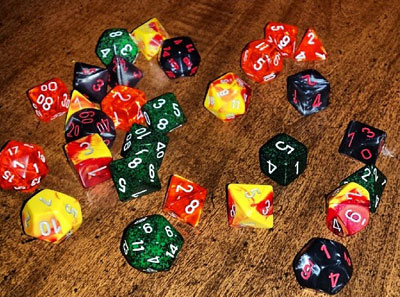Critical Hit
Near as I can figure, Sunday was the 40th anniversary of Dungeons & Dragons.
The articles I’ve seen about the anniversary focus either on the game’s history or the plans for the upcoming new edition of D&D, usually with a side order of “OMG, look at the nerds!” But this is what we’ve come to expect from the mainstream media when it comes to coverage of anything out of the mainstream, right?
I’m not in the best position to talk much about D&D. I haven’t played a D&D game since junior high, and I haven’t played any sort of roleplaying game since college. I know a few folks at work who play Pathfinder, which was based on D&D 3.5 — but I’ve never been very tempted to join in, because it’s been a long, long time since I had any serious interest in playing a fantasy RPG. Modern day games, horror, superhero, lots of other genres are appealing, but I can’t get very interested in playing a wizard or fighter or cleric.
But at the same time, I’ve also maintained serious interest in D&D, even while not playing it. I’ve got sourcebooks from almost every edition of Dungeons & Dragons, including the much-maligned fourth edition, which I think is mostly pretty good. Why do I keep picking them up when I know I’m probably never going to play them? I suspect it’s nostalgia more than anything else. Rust monsters, displacer beasts, beholders, owlbears, and green slimes — you just never get tired of some things.
Anyway, I’ve been thinking about D&D a lot over the past week or so. I’ve seen a lot of articles that mentioned the fiction that influenced Gary Gygax and Dave Arneson — Tolkien, Robert E. Howard, Fritz Leiber, Lovecraft, and many others — but I’ve seen fewer that talked about how Dungeons & Dragons has influenced the world.
Gaming is the most obvious segment of the world that’s been changed by D&D. There’s no way the modern hobby game market would exist without Dungeons & Dragons — Gygax and Arneson invented and popularized the concept of the roleplaying game, paving the way for everything from Earthdawn, Runequest, and Pathfinder to Traveller, Call of Cthulhu, Champions, GURPS, and Vampire: The Masquerade. And you can extend that influence over almost all modern tabletop games — the popularity of D&D revitalized wargaming, inspired card games like Magic: The Gathering and Munchkin, and can claim at least partial influence over most geek-friendly board games out there.
And we’re not talking just tabletop games either. D&D’s game mechanics are used in one form or another in hundreds of video games. Pretty much every fantasy-themed video game, including World of Warcraft, Everquest, and Skyrim, has to claim D&D as a direct influence. And you just couldn’t have the cacodemon from DOOM without the beholder from D&D.
The game’s influence on general pop culture has been fairly strong, especially in recent years, as the nerd stigma has started to reduce — enough geeks have gone into show business that they can now talk openly about how much they loved the game, and even include it in TV shows, movies, songs, and books. And heck, look at that list of celebs who play D&D — it doesn’t even include Dame Judi Dench, who learned the game from Vin Diesel!
Influence on science, academics, journalism, politics, and most other “real world” topics? Probably incidental — but lots of smart kids learned math, storytelling, acting, and social skills by sitting around a table, rolling dice, and fighting imaginary wererats, mindflayers, and Acererak the Demi-Lich. Won’t be long before we have a president who started out as a paladin.


Fritz Freiheit Said,
January 27, 2014 @ 8:06 am
I’d like to thank Gary Gygax and Dave Arneson for publishing a set of rules that were unplayable, but a really great idea. They inspired so much creativity with that simple mistake.
scottslemmons Said,
January 27, 2014 @ 8:26 am
There’s a lot to be said for glorious imaginations and rough frameworks. 🙂
NiceMazeShark Said,
January 30, 2014 @ 2:20 am
I once wrote an essay for a media studies paper about how D&D was a form of new media, and it’s almost unique because it’s whatever the hell people want it to be when they play, but to get through the plot they have to be involved to experience it. This did not go down well, because people were all excited about MMOs and blogs.